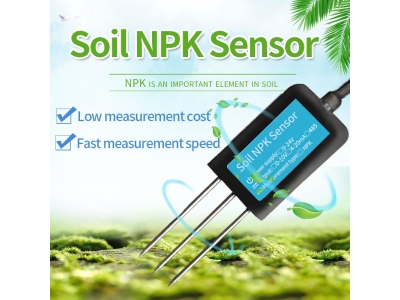Soil sensors, also known as soil moisture sensors or soil moisture meters, have emerged as a powerful tool in modern agriculture. These sensors provide real-time data on soil moisture levels, temperature, nutrient content, and other crucial parameters. By monitoring and analyzing this data, farmers can make informed decisions to optimize crop growth, increase productivity, and effectively manage resources. This article explores the significance of soil sensors in agriculture and their role in optimizing crop growth and resource management.

Understanding Soil Sensors:
Soil sensors are electronic devices that measure and monitor various soil properties. They are equipped with probes or electrodes that are inserted into the soil to collect data. These sensors can measure important parameters such as soil moisture, temperature, pH level, electrical conductivity, and nutrient levels. The data collected by soil sensors is typically transmitted wirelessly to a central monitoring system for analysis.
Optimizing Irrigation:
One of the key benefits of soil sensors is their ability to optimize irrigation practices. By providing accurate and real-time information about soil moisture levels, farmers can avoid overwatering or underwatering their crops. Overwatering not only wastes water but also leads to nutrient leaching and root diseases. Underwatering, on the other hand, can result in stunted growth and reduced yield. Soil sensors help farmers determine the optimal time and amount of irrigation required, leading to improved water use efficiency and crop health.
Efficient Nutrient Management:
Proper nutrient management is critical for ensuring optimal crop growth and productivity. Soil sensors play a vital role in assessing the nutrient status of the soil. By measuring the nutrient content and electrical conductivity of the soil, these sensors provide valuable insights into the soil’s fertility levels. Farmers can then adjust their fertilizer application rates and timing accordingly, avoiding both under and over-fertilization. This precision nutrient management not only enhances crop growth but also minimizes environmental pollution caused by nutrient runoff.
Monitoring Soil Health:
Soil health is a crucial factor in determining crop performance. Soil sensors help farmers monitor the overall health of their soils by measuring parameters such as soil temperature, pH levels, and organic matter content. These indicators provide valuable information about soil quality, microbial activity, and nutrient availability. By tracking these parameters over time, farmers can make informed decisions to improve soil health through appropriate soil amendments, cover cropping, and crop rotation strategies.
Precision Agriculture:
Soil sensors are an essential component of precision agriculture, a farming approach that aims to optimize inputs and maximize outputs. By deploying soil sensors across the field, farmers can create detailed soil maps and generate site-specific data. This information enables them to tailor their farming practices to specific areas and address soil variations within the field. Precision agriculture, facilitated by soil sensors, allows for targeted application of fertilizers, pesticides, and irrigation, resulting in reduced costs, minimized environmental impact, and improved overall farm efficiency.
Integrating Data Analytics:
Advancements in data analytics have further enhanced the capabilities of soil sensors. By integrating soil sensor data with advanced analytics tools and machine learning algorithms, farmers can gain deeper insights into crop growth patterns, soil fertility trends, and other key factors affecting productivity. This data-driven approach enables predictive modeling, allowing farmers to anticipate yield variations, detect early signs of plant stress, and take proactive measures to mitigate risks and optimize crop production.

Conclusion:
Soil sensors have revolutionized modern agriculture by providing real-time data on crucial soil parameters. Their ability to optimize irrigation, manage nutrients efficiently, monitor soil health, enable precision agriculture, and integrate data analytics has transformed farming practices. The power of soil sensors lies in their ability to empower farmers with accurate and timely information, helping them make informed decisions to optimize crop growth, conserve resources, and enhance sustainability. As technology continues to advance, soil sensors will play an increasingly vital role in the future of agriculture, ensuring food security and environmental stewardship.
